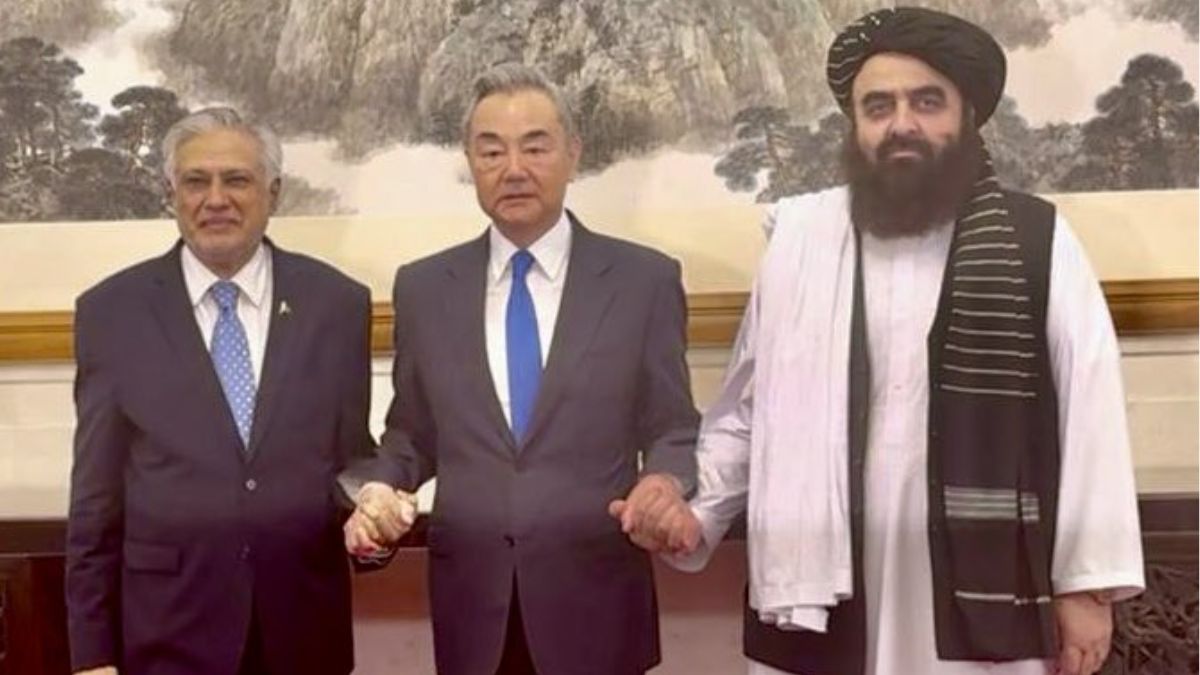Days after the foreign ministers of Afghanistan, China, and Pakistan met in Beijing, Pakistan on Friday announced that it will upgrade its diplomatic relations with Afghanistan by appointing a new ambassador.
According to a PTI report_,_ the breakthrough came during trilateral talks in Beijing this month where China is believed to have played a key role in bridging differences, leading to an agreement between Pakistan and Afghanistan to upgrade diplomatic ties.
Announcing the decision on X, Deputy Prime Minister and Foreign Minister Ishaq Dar wrote, “Pakistan-Afghanistan relations are on positive trajectory after my very productive visit to Kabul with Pakistan delegation on 19th April 2025. To maintain this momentum, I am pleased to announce the decision of the Government of Pakistan to upgrade the level of its Chargé d’Affaires in Kabul to the level of Ambassador.”
Pakistan-Afghanistan relations are on positive trajectory after my very productive visit to Kabul with Pakistan delegation on 19th April 2025. To maintain this momentum, I am pleased to announce the decision of the Government of Pakistan to upgrade the level of its Chargé…
— Ishaq Dar (@MIshaqDar50) May 30, 2025
“I am confident this step would further contribute towards enhanced engagement, deepen Pak-Afghan cooperation in economic, security, CT & trade areas and promote further exchanges between two fraternal countries,” he added.
Pakistan had initially welcomed the Taliban’s takeover of Kabul in 2021, hoping the new regime would address its security concerns. However, things didn’t go as Islamabad wanted, with cross-border attacks by Tehreek-e-Taliban Pakistan (TTP) militants surging sharply.
As tensions escalated, relations deteriorated, and Islamabad began accusing Kabul of sheltering TTP fighters and demanded decisive action against them.
Meanwhile, According to The Express Tribune report, Afghanistan interim ForeignMinister Amir Khan Muttaqi is likely to travel to Islamabad soon on a first visit in two years, highlighting the growing high-level exchanges between the two neighbours in recent weeks.
“He will visit Pakistan soon. Dates are being worked out,” the newspaper quoted a diplomatic source as saying on Thursday.
Impact Shorts
More ShortsAccording to the source, the Afghan side has accepted the invitation, and the upcoming visit will span three days — not just a single day — allowing for comprehensive discussions on bilateral ties.
In April, Foreign Minister Ishaq Dar visited Kabul, the first by a Pakistani minister in three years, which helped ease tensions between the two countries.
Sources said Muttaqi’s visit is part of broader efforts to boost high-level engagement. A roadmap for regular official and ministerial exchanges was drawn up during a visit to Kabul by a Pakistani delegation led by Special Envoy Ambassador Muhammad Sadiq in March.
The Afghan Taliban’s recent actions against groups threatening Pakistan have played a key role in fostering this renewed diplomatic momentum.
In another major sign suggesting a shift in its approach was a statement by senior Afghan Taliban commander Saeedullah Saeed who, on Wednesday, warned militant factions against unauthorised jihad, particularly in Pakistan.
Speaking at a police passing-out ceremony, Saeed said that fighting in any country, including Pakistan, without the explicit command of the Amir is not permissible.
“Joining various groups to wage jihad abroad does not make one a true mujahid,” PTI quoted him as saying.
“Only the Amir of the state has the authority to declare jihad — not individuals or groups.”
Saeed emphasised that those carrying out attacks independently or moving between regions to conduct operations cannot be classified as legitimate fighters under Islamic law.
“Jihad based on personal ego or group loyalty is considered ‘fasad’ (corruption), not legitimate resistance,” he added.
He further stated that the Afghan leadership prohibited unauthorised entry into Pakistan, and any such act constitutes disobedience.
“Groups attacking in the name of jihad are defying both Shariah and the authority of the Afghan Emirate,” he said.
His public statement is seen as a result of recent efforts both by Pakistan and China urging the Kabul administration to change its approach towards these groups.
Sources said Pakistan would continue to encourage the Taliban government to carry out such measures. In return for these steps, Pakistan and China are willing to support Kabul both economically and diplomatically.
With inputs from agencies


)

)
)
)
)
)
)
)
)



